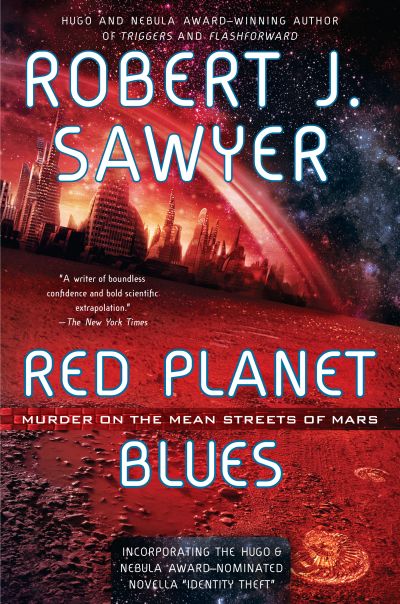The pitch that sold Red Planet Blues
by Rob - July 18th, 2015.Filed under: Red Planet Blues, Writing.

Four years ago today, on July 18, 2011, I sent this pitch to my US and Canadian editors — which eventually led to the book Red Planet Blues:
Hi, Ginjer and Adrienne.
Now that you’ve accepted Triggers, it’s time for me to get to work on my next book (which you’ve already contracted for; it’s due May 8, 2012).
For that project, I’d like to expand two short works of mine into a novel: the novella “Identity Theft” (23,200 words) and the sequel short story “Biding Time” (5,600 words). Copies of both are attached.
Both are science-fiction/mystery crossover stories with a noir flavor featuring the only private detective on Mars. The characters — including gumshoe Alex Lomax, femme fatale Cassandra Wilkins, the timid Rory Pickover, corrupt police official Dougal McCrae, and the obese black-marketeer Ernie Gargalian — might have been played, in an earlier time, by Humphrey Bogart, Lauren Bacall, Peter Lorre, Claude Rains, and Sydney Greenstreet.
These stories are also homages to the Klondike Gold Rush of the 1890s. The Martian frontier town of New Klondike, and its desperate, grizzled prospectors, recall that era (and the similar greed-driven lawlessness of The Treasure of the Sierra Madre).
I spent three months in the summer of 2007 as writer-in-residence at Berton House in Dawson City, in Canada’s Yukon Territory, which was the heart of the Klondike Gold Rush. (Berton House is the family home of the late Pierre Berton, Canada’s leading writer of historical nonfiction, including Klondike, the definitive history of the gold rush.) Dawson City is filled with historical monuments and recreations from the Gold Rush, and my time there will help me evocatively capture that frontier spirit.
The two stories I’m attaching amount to 29,000 words. The novel — which I’d like to call The Great Martian Fossil Rush — would weigh in at 100,000 words, but these works give a flavor of what that book will be like.
The expansion will deal extensively with the backstory only hinted at in the two short works: the discovery of fossils on Mars, which, in an era of cheap everything, become highly sought-after collectibles, spurring the fossil rush. In addition to the two cases Alex Lomax deals with in the short works, the novel would have as its central plot Alex solving the mystery of the murders of Weingarten and O’Reilly, the two explorers who first discovered the evidence of ancient life on Mars.
The source stories have strong pedigrees: “Identity Theft” was a finalist for both the Hugo and the Nebula Awards, and won the world’s largest cash prize for science-fiction writing, Spain’s 6,000-euro Premio UPC de Ciencia Ficción. “Biding Time” won Canada’s Aurora Award and was reprinted in Penguin Canada’s The Penguin Book of Crime Stories, edited by Peter Robinson.
I hope this idea appeals to the two of you as much as it does to me!
All best wishes.
Rob
[In the end, the novel was actually called Red Planet Blues. It ran to 105,000 words, and it didn’t incorporate any of “Biding Time.”]On Facebook, Jon Helms, one of my readers expressed surprise at the above, writing:
Fascinating. I had no idea they contracted authors for unrelated books with delivery dates. I expected that with a series like the The Neanderthal Parallax, I didn’t have any idea it would happen with unrelated books.My reply to Jon:
My career has been mostly two-book and three-book contracts for not-yet-written books, and it’s never it made any difference to my publishers (Ace in the 1990s and again now; Tor in between) whether the books were related or not. If they’re unrelated, the contract will specify what the first one will be, and for the other one or two will say words to the effect of “a property to be agreed upon later” or simply “untitled Sawyer novel.”I’ve never had a publisher object to whatever I later proposed to fulfill the second-book or third-book slots on a contract, and, indeed, a couple of times I’ve changed projects midstream even after the approval (neither Calculating God nor Rollback were the novels I’d originally gotten the go-ahead to write, but, as both ended up being Hugo finalists, no one complained).
Sometimes the pitch for a second or third book has been as elaborate as above; other times, it’s just been me sitting down at a convention for a meal with my editor and verbally outlining what I’m thinking of doing. That was the case, in fact, with my upcoming 23rd novel. I described it — quite vaguely, as I hadn’t worked out a lot of details yet — to Ginjer Buchanan over lunch at the Worldcon in Chicago, she asked questions, called it a “chewy” premise, and said she’d trust that I could pull it off. And, boom, off to work.
Robert J. Sawyer online:
Website • Facebook • Twitter • Email

